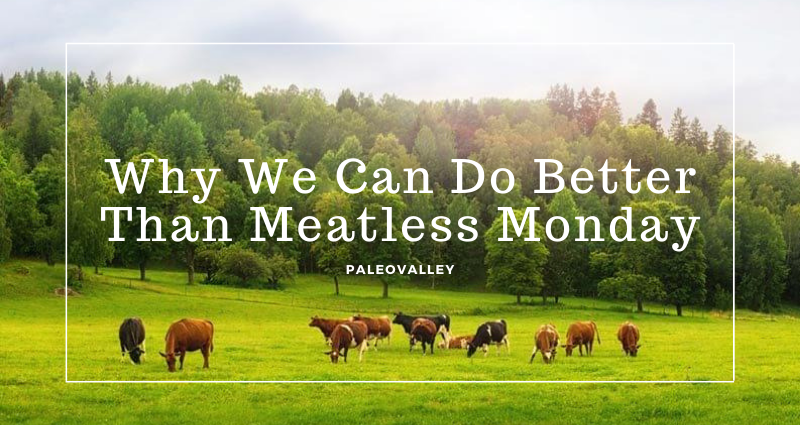
Why We Can Do Better Than Meatless Monday
I have a different take on “Meatless Monday” than most.
I know it’s typically done out of love for animals and care for the environment.
But I wonder if we’re really doing enough… and if Meatless Monday is even making the impact supporters want?
Don’t get me wrong. I respect anyone trying to do right by their body and the environment!
However, if we look at the big picture, I think there are more fruitful steps we can take… 4 in particular.
4 Problems with Meatless Monday
#1. It demonizes all animal products.
Yes, I hate CAFOs just as much as anyone, but the environmental consequences of holistically managed cows are entirely different and even regenerative.
I think this sends the wrong message because it lumps all meat together - whether from mistreated cattle or responsibly raised happy cows.
And for those who do it for health reasons, thinking red meat is bad for you, think again.
The same study that linked red meat to cancer ALSO said this:
“Red meat intake was calculated using…all types of beef and pork and included bacon, beef, cold cuts, ham, hamburgers, hotdogs, sausage...”
So whether it was highly processed, preservative-laden pork hotdogs or a cut of lean grass fed beef, it was collectively called “red meat.”
Which brings us back to the “lumping all meat together” problem.
Just like the processing matters, the raising of the beef matters too. We can’t look at certain operations (like CAFOs) and claim all cows are treated that way.
Even more importantly, those who forgo all meat are less likely to learn about these important nuances. And that’s one way misinformation spreads.
#2. It eliminates a valuable protein source.
When we remove meat from our diet, we forfeit one of the best tools for balancing blood sugar.
Blood sugar swings not only make us “hangry,” they can set the stage for insulin resistance. Over time, that can lead to type 2 diabetes, heart disease, and more.
Since protein slows sugar absorption into the bloodstream, it helps protect against dangerous spikes and dips.
#3. It can lead to higher consumption of monocultures.
Meatless Mondays mean more people will likely be consuming more monocultures like wheat, corn, soy, and GMOs.
Other than their detrimental health effects, here’s why that’s a problem…
These single crops are repeatedly grown on the same land. This action depletes the soil and saturates it in toxic herbicides and pesticides… over and over again.
Soil that is dry and depleted is susceptible to erosion, which leads to runoff, which leaks all those toxins into our waterways.
Not good for the ground. Not good for nearby wildlife. Not good for you and me.
#4. Sustainable is not enough, we need to think regenerative.
Unfortunately, the environmental destruction is too great.
We’re not able to just focus on sustainability anymore. We need to shift our focus to regeneration BEFORE sustainability.
If we’re just cutting animal products out of the equation, we’re not supporting the farmers who use regenerative practices.
And research shows it’s the regenerative raising of cattle that’s really making a difference.
In fact, carbon sequestration research by Dr. Jason Rowntree and Bill Harris revealed something truly remarkable:
Holistic, rotational grazing can actually store more carbon in the soil than cows emit in their lifetime.
To put it another way… Responsibly raised grass fed beef can be CARBON NEGATIVE.
It’s even been shown to help build topsoil, which is what we truly need for the health of our planet and future generations.
Here’s how:
- Manure adds microorganisms to the soil, which increases biodiversity and keeps soil nutrient-rich and thriving.
- Grazing stimulates grass growth.
- Roaming makes soil more porous, allowing rainwater to collect and absorb and seeds to germinate.
Researchers have long known that healthy soil is a balance between microorganisms, proper water infiltration, worms, and more.
While modern farming tries to mimic that with additives and fertilizers, rotational grazing does it naturally.
So maybe instead of #MeatlessMonday, we should think more like #RegenerativeMonday.
And if you really want to support the environment and optimize your health, maybe a Sugar Free Sunday would be more productive.
Because sugar is far more harmful to you (and the environment) than properly raised animal products.
>>> Learn more about a healthy snack that’s sugar free AND supports regeneration here!
And again, I applaud any efforts by those who care deeply about environmental health.
And I’m not criticizing anyone who participates in Meatless Monday.
I just hope to help everyone see the bigger picture and make the greatest impact!






